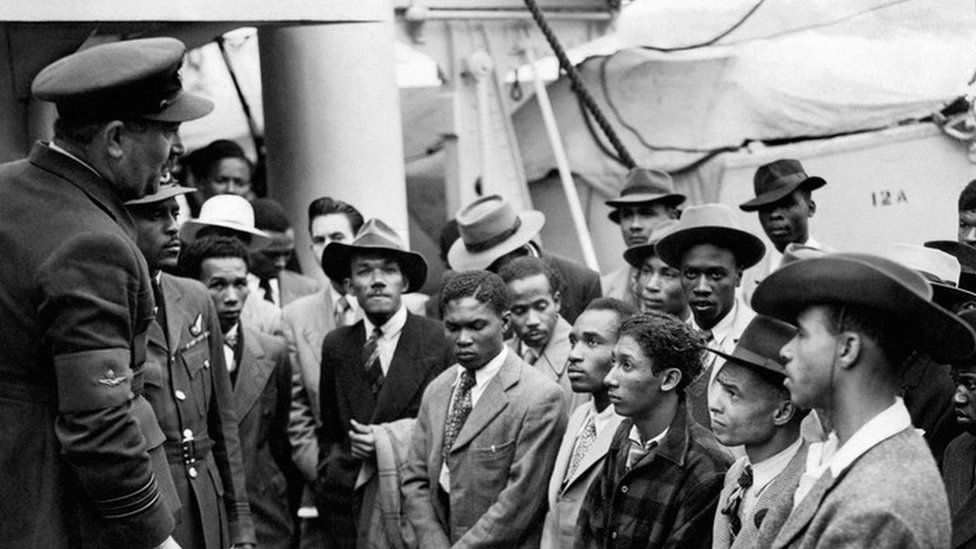Windrush: How do you prove you've been living in the UK?
- Published

Many Windrush migrants who have had their legal status called into question have been in the UK for decades, often paying taxes and making pension contributions.
It seems intuitively that anyone living and working in a country for a long period will leave a significant paper trail. So why are some finding it so difficult to prove?
Part of the problem has been a requirement to provide four pieces of evidence for each year that a person has been in the country.
Windrush migrants must prove they have been in the UK continually since 1 January 1973, when they were granted the right to stay in the country permanently. Anyone who has left the country for more than two years loses their right to remain.
The Home Office did not keep records of the people to whom it granted indefinite leave to remain in the 1970s. Some stayed but did not apply for British citizenship meaning there is no official record of their legal status.
To gain this official recognition, people must apply for an official stamp known as No Time Limit (NTL), at a cost of £229.
The Home Office has put the onus on the individual to provide evidence.
It has not been using central tax and pension records, which could prove someone has been working, to support people's applications. Instead, the current system relies on people having kept their own documentation including payslips and bank statements.
Guidance published this week has softened the requirements, saying any evidence will be considered that helps to build a picture of someone's life in the UK including:
- where you went to school
- where you might have studied
- where you have worked
- whether you have family here
- where you have lived while in the UK
Immigration minister Caroline Nokes told the BBC's Daily Politics programme that the Home Office would no longer ask for four pieces of evidence for each year of residence.
She said that the Home Office would work with the tax and benefits authorities to "establish those records which may not be available at first hand to the individuals concerned".
Why is this a problem now?
Changes to the immigration system during Theresa May's tenure as home secretary clamped down on people living in the UK illegally.
The Immigration Act 2014 introduced requirements on landlords, employers, banks and the NHS to check people's immigration status. This was designed to restrict illegal immigrants' access to work and public services like healthcare, benefits and housing.
These requirements were made more stringent in 2016.
Some people who arrived legally decades ago are being caught out by these checks when they try to rent a house or get medical treatment, but aren't able to prove their status.
Denied NHS treatment
Although we have anecdotal evidence, there's no central record of how many people have been denied medical treatment because of their immigration status.
Since October, NHS hospitals in England have had a legal duty to charge overseas patients upfront for non-urgent care if they are not eligible for free treatment. That includes EU citizens who have been in UK less than six months.
The regulations require NHS bodies to make inquiries about whether patients are here legally and ordinarily resident in the UK, in order to charge those who aren't entitled to free care.
The Windrush migrants are entitled to treatment - their problem has been proving this.
Guidance v reality
The Joint Council for the Welfare of Immigrants' head of legal and policy, Chai Patel, told BBC Reality Check that while in theory there is flexibility in the guidelines, this is not how it has been applied in practice.
Timothy Lawrence, a solicitor for the Southwark Law Centre, said: "The approach has, for many years, been to refuse to accept any claimed period of residence in the absence of independent documentary evidence covering the entire period, with no benefit of the doubt given.
"One of my clients, who had lost the passport she used to enter the UK as a child with indefinite leave, was refused confirmation that she had retained that status in spite of her having supplied the Home Office with a copy of the passport," he added.
There have been several cases of people who have been refused NHS treatment, detained in immigration centres and almost deported in the case of Paulette Wilson, who was taken as far as Heathrow before her MP intervened.
However, there appears to be some confusion in government over whether anyone has actually been deported. Although there are figures available for deportations (there were 12,321 enforced returns last year), it's not possible to tell from these whether any were Windrush migrants.
How many people could be affected?
Of the 524,000 people living in the UK in June 2017 who arrived from a Commonwealth country before 1971, 57,000 of them are not UK nationals.
Of this group, 15,000 were from Jamaica, 13,000 from India and 29,000 from elsewhere.
The University of Oxford's Migration Observatory notes that these figures don't tell us how many people are now likely to be having difficulty demonstrating their legal status in the UK. This is still unknown.
It also points out that nationality data is self-reported and so anyone who mistakenly believes they are a UK citizen, as has been the case for some of the Windrush generation, will not be included.
If you have a story about the Windrush generation, you can email [email protected]. Please include a contact telephone number if you are happy to speak to a BBC journalist.
You can also contact us in the following ways:
- Tweet: @BBC_HaveYourSay
- WhatsApp: +44 7555 173285
- Upload your pictures/video here
- Text an SMS or MMS to 61124 (UK) or +44 7624 800 100 (international)